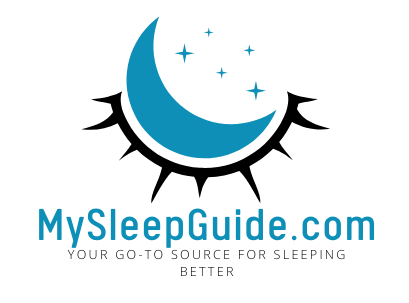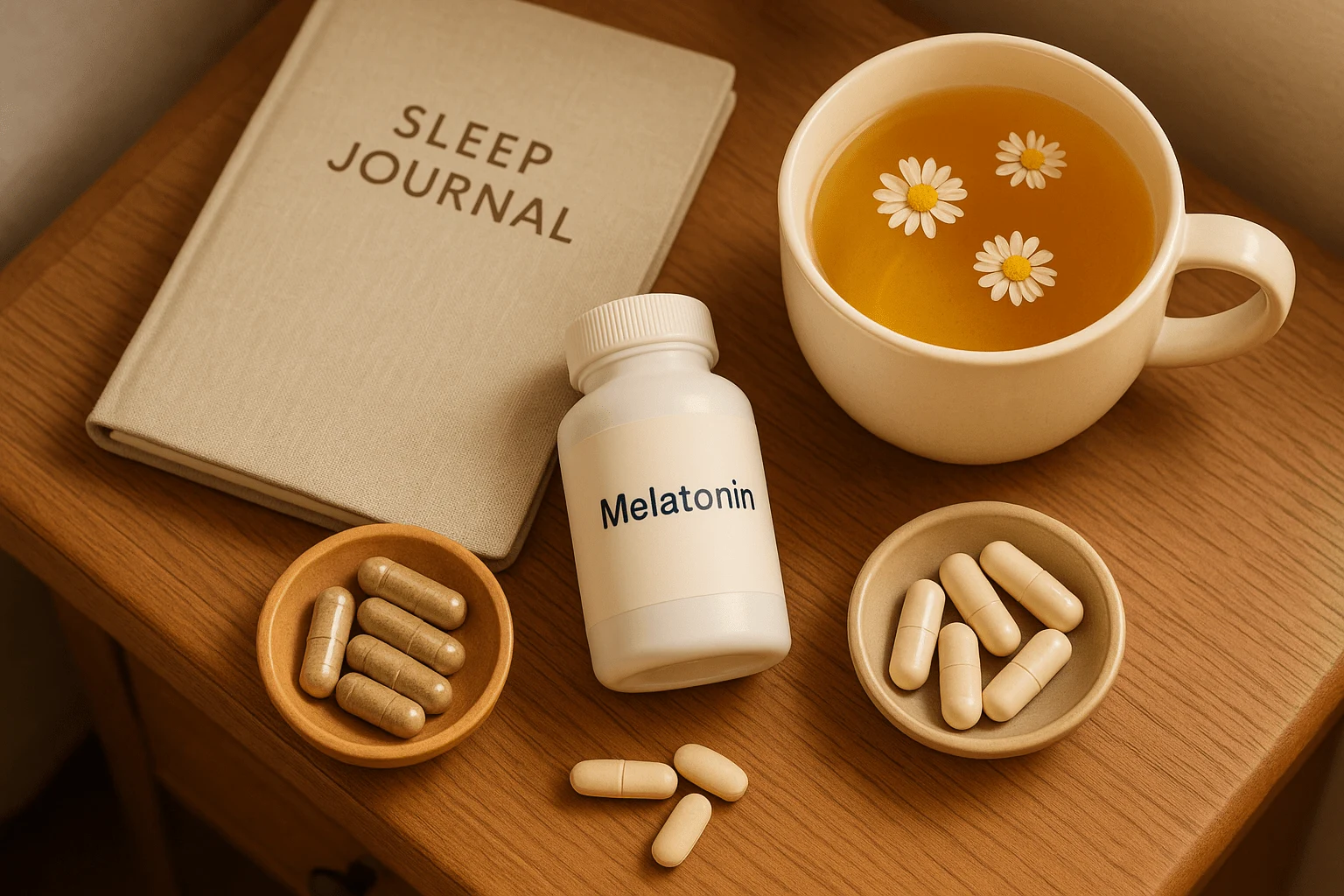If you’ve ever struggled to fall asleep, wake up too often during the night, or feel groggy even after a full 8 hours, you’re not alone. Many people turn to sleep supplements as a way to support better rest — especially when lifestyle changes alone aren’t enough.
But here’s the challenge: the supplement aisle is crowded with pills, powders, and drops promising everything from instant relaxation to deeper REM sleep. Not all of them are effective. And some may not be right for you.
This guide will walk you through the essentials — how sleep supplements work, which ones are most commonly used, what to look for in a quality product, and how to use them safely. Whether you’re curious about melatonin or exploring herbal alternatives like valerian root or magnesium, you’ll leave with the clarity you need to make informed, confident choices.
The Truth About Sleep Supplements: How They Work (and Don’t)
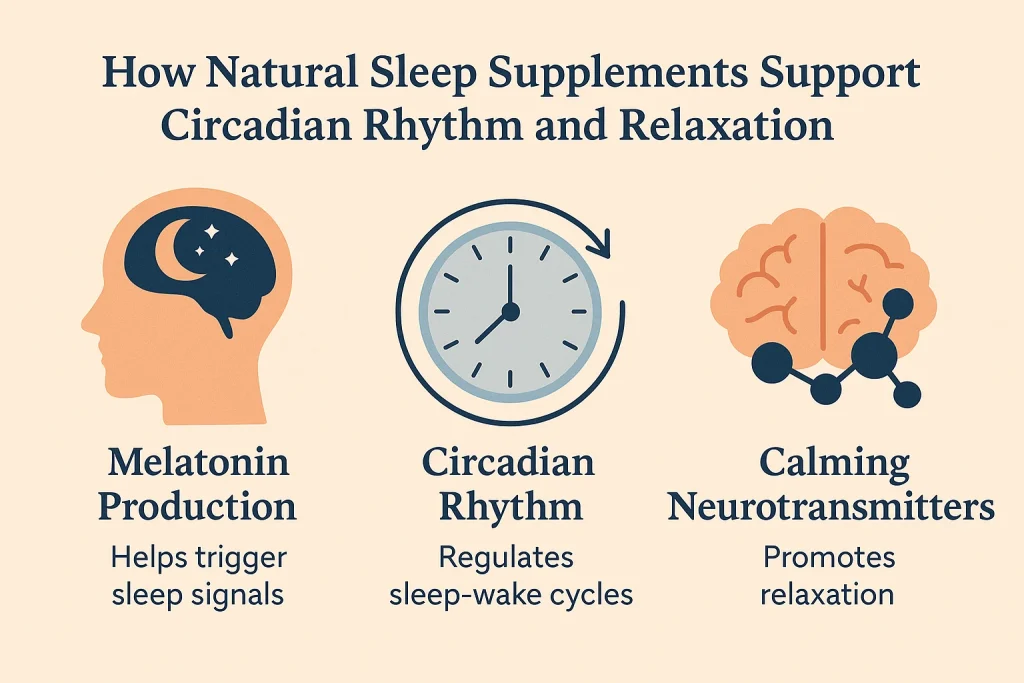
Before you add a sleep supplement to your routine, it’s important to know what it actually does — and what it doesn’t. These natural sleep aids aren’t meant to knock you out like prescription sleeping pills. Instead, they work by supporting your body’s natural sleep-wake cycle — helping you relax, unwind, and ease into sleep.
How Sleep Supplements Work: Support, Not Sedation
Most natural sleep supplements work by targeting specific processes in your body that regulate rest:
- Melatonin: This hormone tells your body it’s time for sleep. Melatonin supplements are especially helpful for resetting your internal clock — like after jet lag or shift work.
- Magnesium: A vital mineral that helps calm your nervous system and relax tense muscles. It’s often used for stress-related insomnia or restless nights.
- L-theanine, valerian root, and CBD: These calming compounds may boost relaxation by increasing GABA and other soothing brain chemicals. They don’t sedate — they simply help quiet the mind.
What They Don’t Do
- They don’t treat chronic insomnia or medical sleep disorders.
- They won’t override poor sleep habits, excessive screen time, or inconsistent bedtimes.
- They aren’t meant for daily, long-term use without guidance — especially melatonin.
In other words, think of them as tools — not solutions on their own. For the best results, supplements should be paired with a supportive sleep environment and consistent routine.
A Breakdown of the Most Popular Natural Sleep Supplements
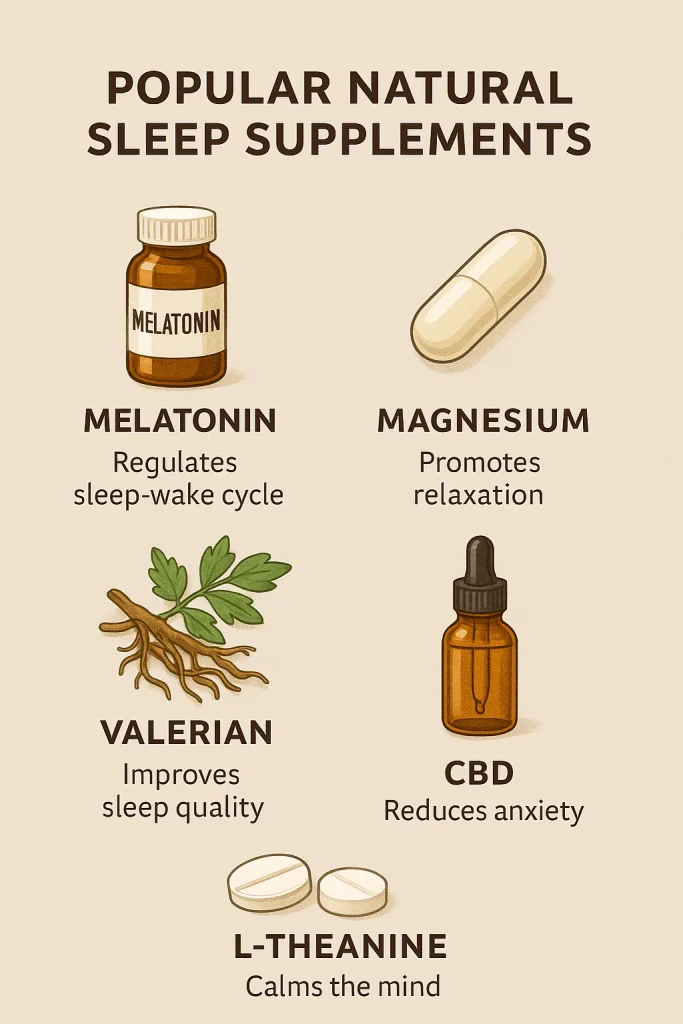
f you’re new to sleep supplements, the number of options can feel overwhelming. Below are some of the most commonly used natural sleep aids, along with how they work and who they may benefit. These aren’t one-size-fits-all — understanding each one’s role can help you choose wisely.
Melatonin
- What it does: Melatonin is a hormone your brain naturally produces at night. As a supplement, it’s used to signal sleep onset — especially useful for jet lag or irregular sleep patterns.
- Best for: Resetting your circadian rhythm, short-term use
- Caution: Not ideal for nightly use; too much can disrupt your body’s natural production.
Magnesium
- What it does: Plays a key role in muscle relaxation and nervous system calming. It may also help reduce nighttime anxiety.
- Best for: Stress-induced insomnia, muscle tension, trouble staying asleep
- Forms to look for: Magnesium glycinate or citrate (more bioavailable)
- Valerian Root
- What it does: A traditional herbal remedy thought to interact with GABA receptors, promoting a sense of calm.
- Best for: Occasional sleeplessness, especially tied to anxiety
- Some users report vivid dreams or grogginess — start with a low dose.
L-Theanine
- What it does: An amino acid found in green tea that promotes calm without sedation.
- Best for: Racing thoughts, overstimulation, mental tension before bed
- Bonus: Can be paired with magnesium or melatonin safely
CBD (Cannabidiol)
- What it does: May reduce inflammation, ease anxiety, and improve overall sleep quality. Results vary based on dose and formulation.
- Best for: Chronic pain, nighttime restlessness, anxiety-related sleep issues
- Choose products that are third-party tested and clearly labeled.
- Want something simpler? Start with magnesium before trying multi-ingredient blends. It’s widely tolerated and supports both mind and body relaxation.
Related Post: Struggling to Sleep? Try These 15 Natural Sleep Hacks
How to Choose a Safe, Effective Sleep Aid
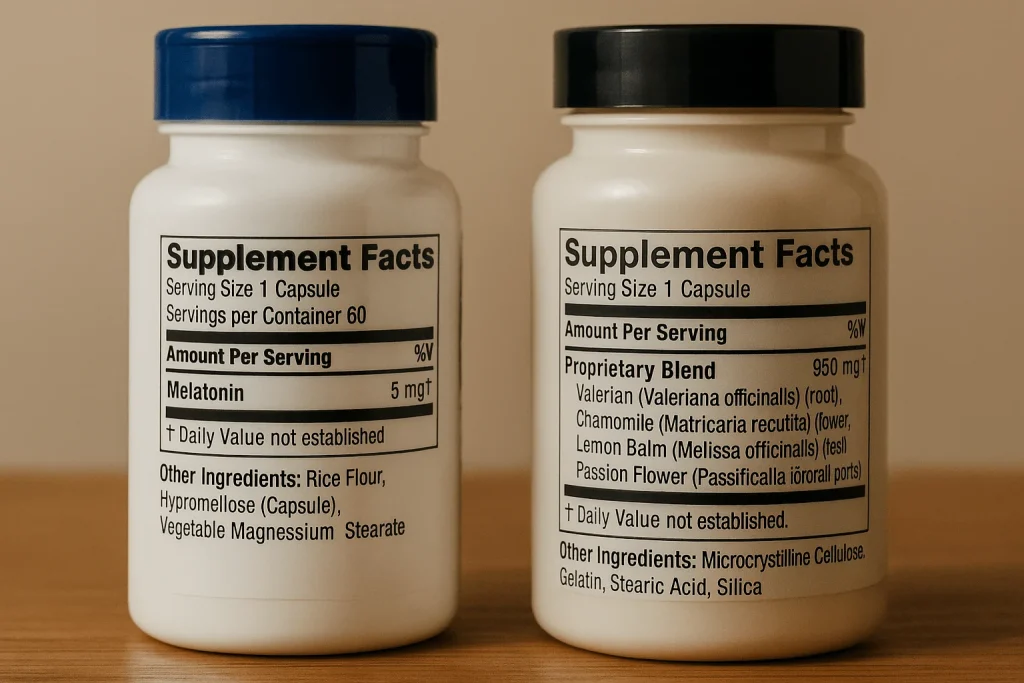
Not all sleep supplements are created equal. If you’re considering adding one to your routine, it’s worth taking a closer look at the label — and beyond. Here’s how to choose a product that’s both safe and effective.
1. Transparent Labeling
Look for supplements that clearly list:
- All active ingredients and their dosages
- The form of each ingredient (e.g., magnesium glycinate vs. oxide)
- No “proprietary blends” where you don’t know how much of each component you’re getting
✅ Key tip: If you can’t verify what’s in it, it’s not worth taking.
2. Clean, Natural Ingredients
Avoid products with unnecessary fillers, dyes, or artificial preservatives. A natural sleep supplement should contain only what you need to support relaxation and rest.
- Choose non-GMO, gluten-free, and allergen-friendly options when possible
- Look for plant-based capsules or powders if you’re avoiding gelatin
3. Third-Party Testing
Reliable brands have their products tested by independent labs for purity, potency, and safety. This helps ensure you’re not getting unwanted contaminants like heavy metals or misleading dosages.
- Look for seals or certificates on the packaging or the brand’s website
- If this info isn’t available, consider a better-reviewed brand
4. Right Form & Dosage
Whether it’s a capsule, gummy, or powder, form matters — but so does how much you take. Many over-the-counter sleep aids come in doses higher than you need.
- Start low, especially with melatonin or valerian root
- Watch for added ingredients that may interfere with medications
5. Brand Reputation & Real-User Reviews
Check verified reviews to get a sense of how a supplement performs in real life — especially for those with insomnia or trouble staying asleep. Be wary of generic praise with no detail.
When and How to Take Sleep Supplements
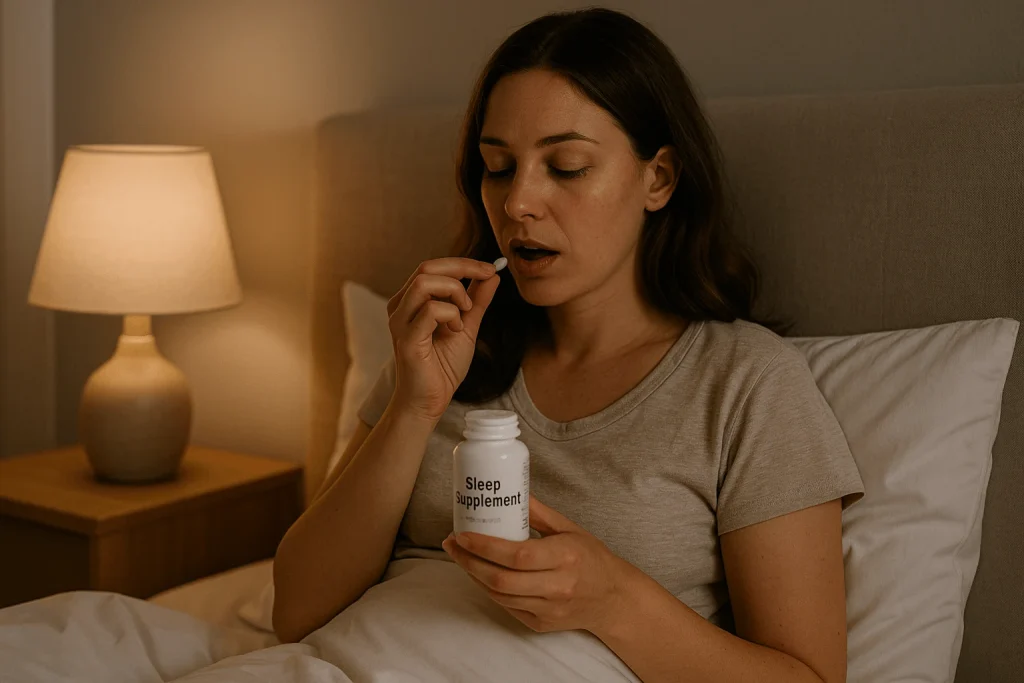
Choosing the right sleep supplement is only part of the equation. To make sure it works effectively, it’s just as important to take it the right way, at the right time. Below are some general guidelines to help you get the most out of your sleep aid.
Timing Is Key
When you take your supplement can make all the difference in its effectiveness. For most sleep aids, timing is critical to ensure they help you fall asleep smoothly.
Melatonin: Take 30–60 minutes before bedtime. This helps signal to your body that it’s time to wind down.
Magnesium: If you’re using magnesium for muscle relaxation or anxiety reduction, try taking it 30–60 minutes before bed. It’s best for nighttime restlessness or stress-induced sleep problems.
Herbal Supplements (Valerian Root, L-Theanine): These work best when taken about 30 minutes before bedtime, but you can experiment with timing to see what suits you.
Tip: For herbal sleep aids, consistency is key. Take them at the same time every night to help establish a sleep routine.
Related Post: 7 Herbal Teas for Sleep That Calm Your Mind Fast
How Much to Take
Dosing varies widely depending on the supplement, so it’s crucial to start with the recommended dose — especially for potent ingredients like melatonin or CBD. Some people may experience side effects if they take too much, such as grogginess or disrupted sleep cycles.
- Melatonin: Start with a low dose (0.5–1mg). Many people don’t need more than this.
- Magnesium: Generally safe at 200–400mg, but start low to gauge how your body reacts.
- Valerian Root: Follow the product’s instructions, but start with a lower dose if you’ve never used it before.
Stick with the lowest effective dose, and only increase if needed.
Best Practices for Incorporating Sleep Supplements
To ensure you’re setting yourself up for success:
- Consistency: Make supplements a part of your bedtime ritual. This signals your body that it’s time to unwind.
- Sleep Hygiene: Supplements are most effective when paired with healthy sleep habits, like reducing screen time, making your room dark, and sticking to a regular bedtime.
Who Should Be Cautious or Avoid Sleep Supplements

While most over-the-counter sleep aids are considered safe for short-term use, they’re not appropriate for everyone. If you fall into any of the groups below, it’s best to speak with your doctor before trying any new supplement — even a natural one.
1. Pregnant or Breastfeeding Women
There’s limited research on the safety of most sleep supplements during pregnancy or while nursing. Ingredients like valerian root, melatonin, or CBD may cross into breast milk or affect hormone levels.
Always check with your healthcare provider before using any supplement while pregnant or breastfeeding.
2. People Taking Medications
Some supplements interact with prescription drugs, especially those that affect the nervous system or hormone balance.
Melatonin can interfere with blood pressure medications, antidepressants, or diabetes medications.
Valerian root may amplify sedative effects or alter how your liver processes other drugs.
CBD has potential interactions with blood thinners and seizure medications.
If you’re on any regular medication, especially for anxiety, depression, or blood pressure, consult your provider first.
3. Individuals With Underlying Health Conditions
People with the following conditions should be cautious:
- Autoimmune diseases (melatonin may overstimulate the immune system)
- Liver conditions (CBD and other compounds are processed through the liver)
- Epilepsy or seizure disorders
- Hormonal imbalances or thyroid issues
4. Children and Teenagers
Sleep supplements are rarely recommended for young people without medical supervision. Their developing bodies may respond differently, and melatonin use in children is still under debate in the medical community.
5. Sensitive or First-Time Users
If you’ve never used a sleep supplement before, always:
- Start with a very low dose
- Try it on a night where you can sleep in (in case it affects your energy the next morning)
- Monitor how your body responds
Even natural sleep supplements can cause side effects or interact with medications. Know your health profile and talk to the provider if you’re unsure.
New Post: How to Practice Sleep Thinking for Deeper Sleep and Insightful Mornings
Final Thoughts: Start Small and Track What Works
Sleep supplements can be a helpful part of your nighttime routine — especially if you’re looking for a natural way to ease into rest. But like any tool, they work best when used intentionally and combined with consistent sleep habits.
If you’re just starting out:
- Choose one supplement based on your specific sleep challenge — such as magnesium for nighttime anxiety or melatonin for adjusting your sleep schedule.
- Stick to the lowest effective dose and avoid combining multiple new ingredients at once.
- Track your response over 5–7 nights. Pay attention to how quickly you fall asleep, how often you wake up, and how you feel the next morning.
What Does That Mean in Practice?
Let’s say you’re having trouble falling asleep due to stress. You might try 200mg of magnesium glycinate 30 minutes before bed, keep screens off an hour before sleep, and journal for 5 minutes to wind down.
If you notice better rest, you’ve found a potential solution. If not, you can adjust — or consider a different supplement better suited to your needs.
Final takeaway: Sleep supplements aren’t a cure-all, but they can help restore balance when used thoughtfully. Start simple, stay consistent, and build on what works for your body.
